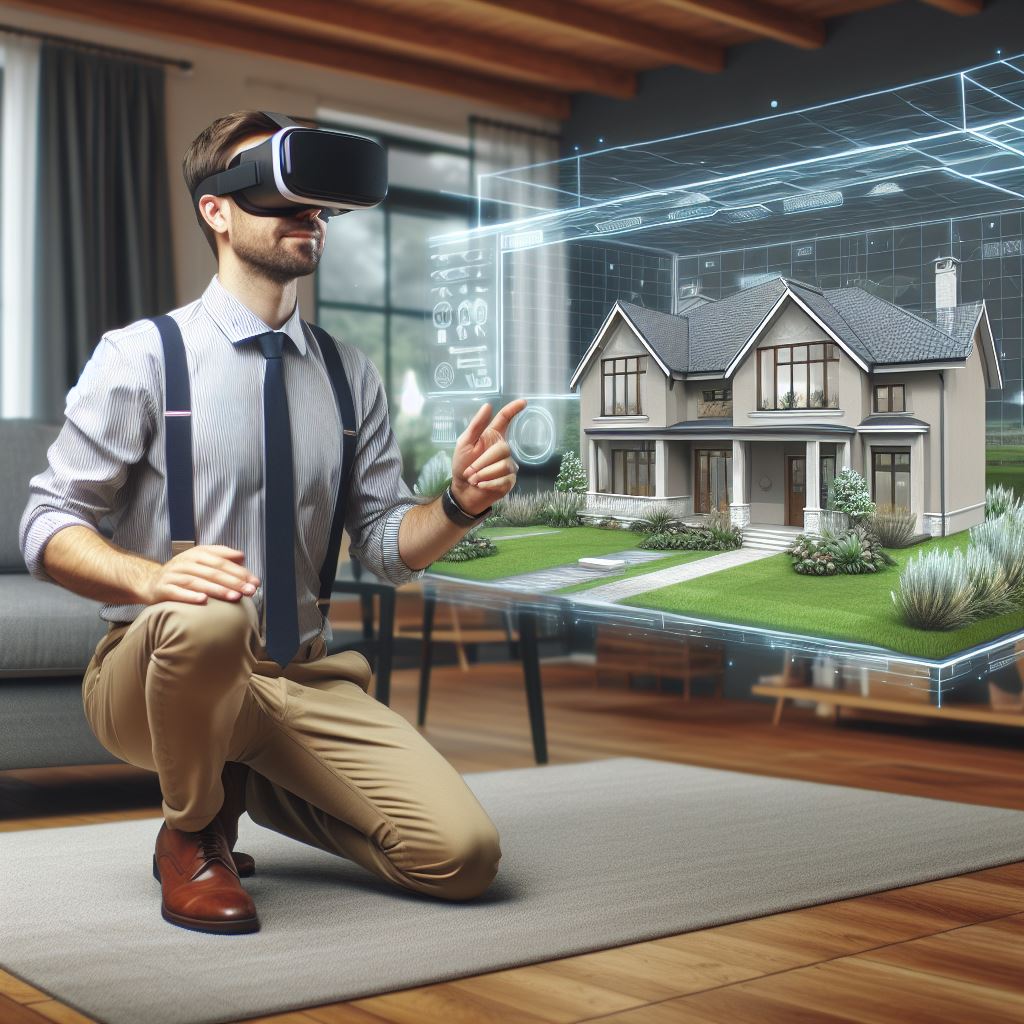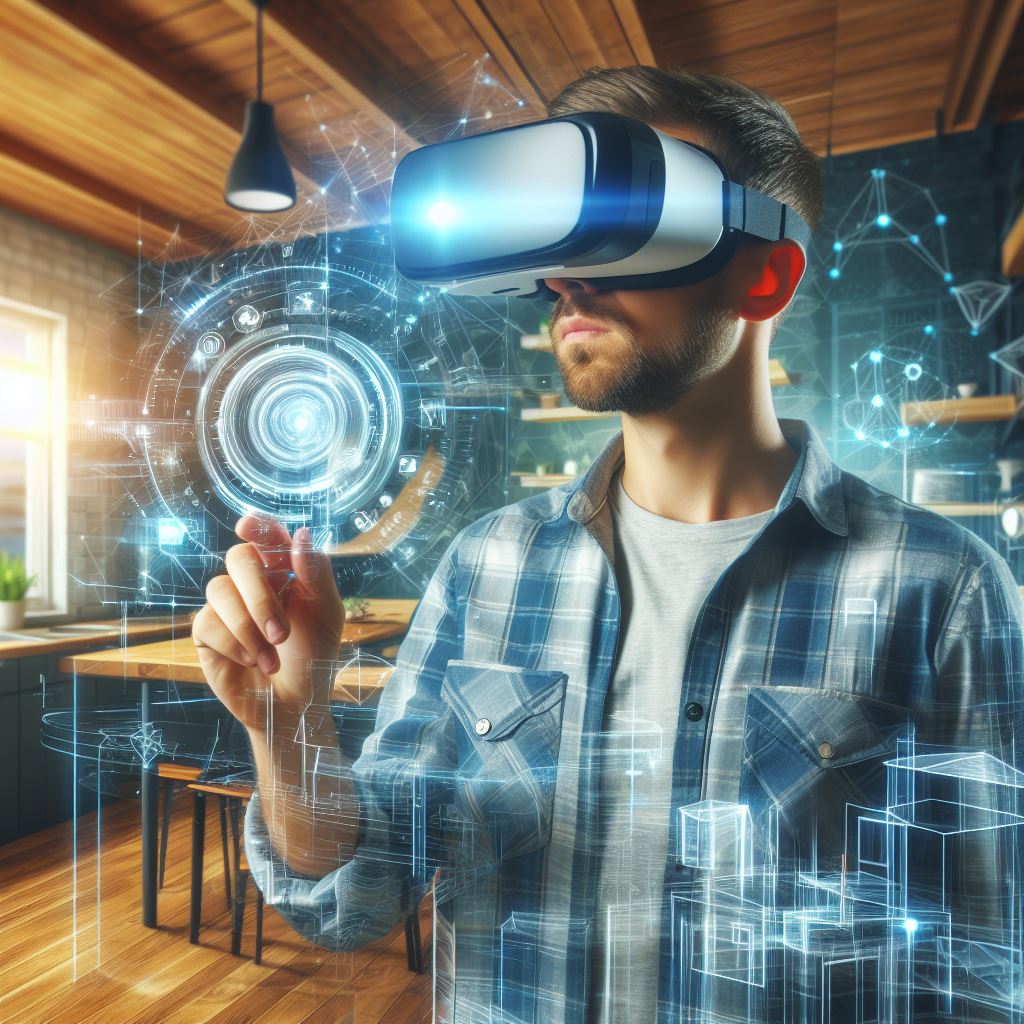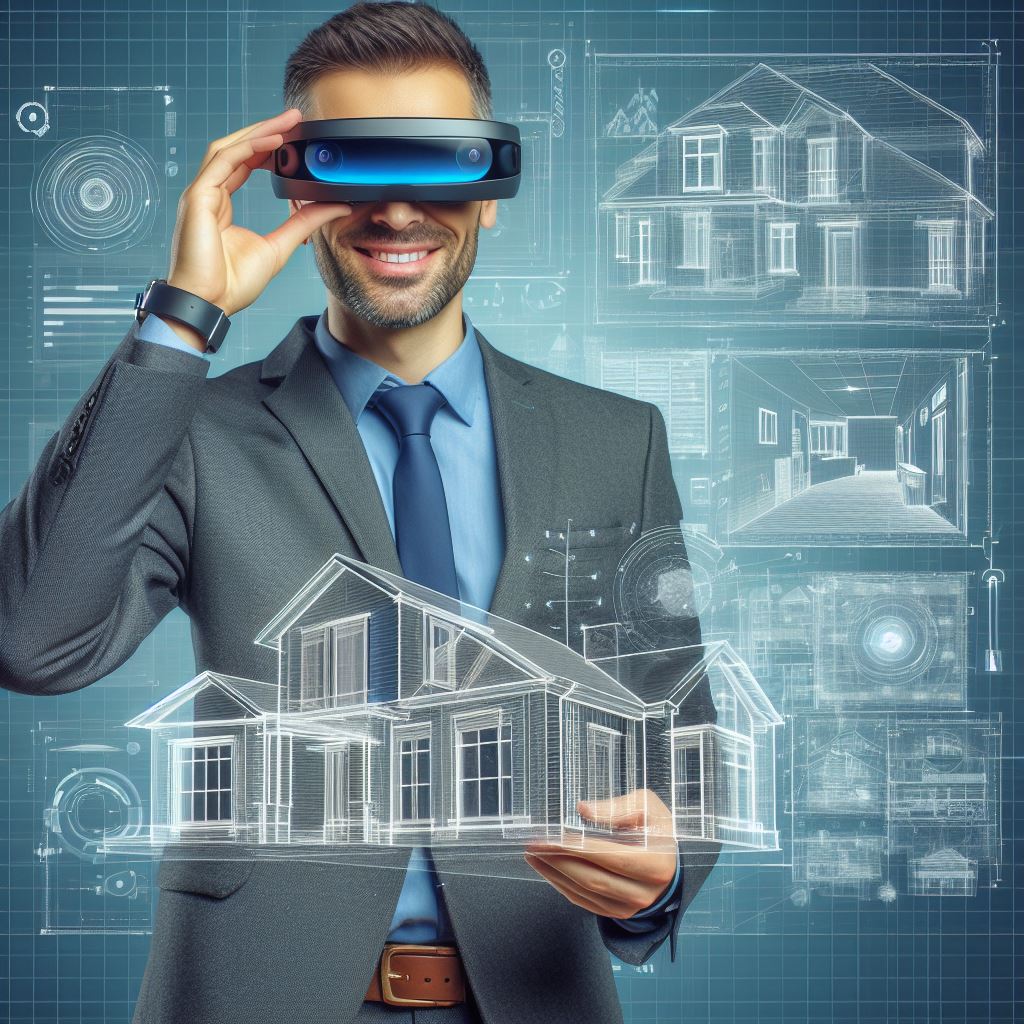Introduction
In the ever-evolving landscape of real estate, technological advancements have continually reshaped the industry.
One such groundbreaking innovation is Augmented Reality (AR), proving to be a game-changer in how we perceive, buy, and sell properties.
Augmented Reality, often abbreviated as AR, is a technology that overlays digital information onto the physical world, enhancing the user’s real-world experience.
In the context of real estate, AR seamlessly integrates computer-generated graphics, data, and other virtual elements into the live view of a property.
The real estate sector, traditionally reliant on static images and descriptions, is now embracing AR to revolutionize property showcasing.
AR in real estate provides potential buyers with immersive and interactive experiences, allowing them to virtually explore properties in a dynamic and engaging manner.
This technology bridges the gap between imagination and reality, giving prospective buyers a tangible sense of the property’s potential.
Technology has become an integral force driving change in the real estate industry.
From online listings to virtual tours, the integration of technology has streamlined processes, making property transactions more efficient.
AR takes this a step further by providing an unparalleled visual experience, making it easier for buyers to envision themselves in a potential home.
Real estate professionals can leverage AR to create virtual staging, allowing clients to visualize various design options before committing to a purchase.
As we delve deeper into the realms of AR in real estate, subsequent sections will explore its practical applications, benefits, and potential challenges.
In a world where first impressions matter, AR emerges as a powerful tool, not only enhancing property marketing but also reshaping the entire home-buying experience
Join us on this journey as we uncover the transformative impact of AR, reshaping the future of real estate.
Benefits of AR in Real Estate
In recent years, augmented reality (AR) technology has emerged as a game changer in the real estate industry.
Transform Your Real Estate Decisions
Unlock personalized real estate insights crafted just for you. Get actionable advice designed to amplify your success.
Get StartedBy integrating virtual elements into the real world, AR offers numerous benefits that revolutionize the way properties are visualized, bought, and sold.
Enhanced property visualization
One of the key advantages of AR in real estate is enhanced property visualization.
Virtual property tours enable potential buyers to explore properties remotely and in detail.
Through a mobile device or head-mounted display, buyers can navigate through different rooms and areas of a property, gaining a realistic understanding of its layout, design, and features.
This saves time and effort compared to physical property visits, making the search for the perfect property more convenient and efficient.
Another aspect of enhanced property visualization is interior customization options.
AR technology allows buyers to virtually decorate and personalize a property to their preferences.
By visualizing different furniture arrangements, color schemes, and materials, buyers can better visualize the potential of a space and make informed decisions about remodeling or interior design.
Time and cost savings
AR in real estate also provides significant time and cost savings.
The reduced need for physical property visits saves time and money for both buyers and sellers.
Potential buyers can virtually visit multiple properties from the comfort of their own homes, eliminating the need for travel and site visits.
This not only streamlines the property search process but also expands the market reach for sellers, as properties can be showcased to a wider audience without geographical limitations.
Furthermore, AR technology enables a faster decision-making process for both buyers and sellers.
By providing a wealth of information and visualizations, AR empowers buyers with comprehensive knowledge about a property, helping them make quicker and more informed decisions.
Showcase Your Real Estate Business
Publish your company profile on our blog for just $200. Gain instant exposure and connect with a dedicated audience of real estate professionals and enthusiasts.
Publish Your ProfileSimilarly, sellers can benefit from faster transactions, as potential buyers can gather more information about a property through AR before deciding to visit it physically.
Improved buyer experience
AR in real estate greatly improves the buyer experience.
The interactive nature of AR enables potential buyers to explore and interact with a property in a more engaging and immersive way.
Virtual staging, for example, allows buyers to visualize a property with different furniture and decor, helping them envision themselves living in the space.
This creates a more emotional connection and enhances the overall buying experience.
Additionally, AR technology ensures accurate size and scale assessment.
Buyers can use AR tools to measure dimensions, assess room sizes, and understand the layout of a property without physically being present.
This not only provides a more realistic sense of space but also helps buyers decide whether a property meets their spatial requirements and preferences.
In fact, AR is a game changer in the real estate industry due to its numerous benefits.
From enhanced property visualization and time/cost savings to improved buyer experience and accurate size assessment, AR technology transforms the way properties are marketed, explored, and bought.
As the technology continues to evolve, it is expected to become an indispensable tool for both buyers and sellers in the real estate market.
Read: VR Tours: The Future of Home Showings
Applications of AR in Real Estate
Augmented Reality (AR) has become a game changer in the real estate industry.
Its applications have revolutionized various aspects of the business, from marketing and advertising to client consultations and agent training.
Property marketing and advertising
In property marketing and advertising, AR technology has brought significant advancements.
One of the most notable is virtual staging.
With AR, real estate agents can digitally furnish and decorate empty properties, creating visually appealing listings that attract potential buyers.
By virtually staging a property, agents can showcase its full potential and help buyers imagine themselves living in the space.
This has significantly increased the effectiveness of property marketing and advertising campaigns.
Additionally, AR allows for the visualization of future property developments.
Through AR applications, potential buyers can see how a property will look like upon completion, even if it is still in the planning or construction stage.
This enables developers to effectively market and sell properties before they are built, providing buyers with a realistic preview of their investment.
Client consultations and customizations
Client consultations and customizations have also been transformed by AR technology.
Virtual property walkthroughs have become a popular tool, especially for remote clients.
Through AR, clients can explore properties from the comfort of their homes, saving time and effort.
This virtual experience provides an accurate representation of the property, allowing clients to make informed decisions without physically visiting the site.
Additionally, VR headset experiences take this to the next level by offering an immersive and interactive viewing experience.
Clients can navigate through properties, customize design elements, and truly visualize themselves in the space.
Real estate agent training and education
Real estate agent training and education have also been enhanced through the use of AR.
Simulated practice scenarios provide agents with a platform to fine-tune their skills and enhance their decision-making abilities.
Showcase Your Real Estate Business
Publish your company profile on our blog for just $200. Gain instant exposure and connect with a dedicated audience of real estate professionals and enthusiasts.
Publish Your ProfileBy engaging in realistic scenarios, agents can improve their negotiation tactics, contract management, and problem-solving skills.
Furthermore, interactive training materials, such as AR-enabled textbooks and online modules, allow agents to learn about different real estate scenarios in a dynamic and interactive way.
This enhances their understanding and retention of important information.
In conclusion, AR has proven to be a game changer in the real estate industry, transforming the way properties are marketed, consultations are conducted, and agents are trained.
From virtual staging and visualizing future developments to virtual property walkthroughs and immersive training experiences, AR technology has revolutionized various aspects of the real estate business.
Its impact will continue to grow, making AR an essential tool for real estate professionals in the future.
Read: Tech in Commercial Real Estate Growth

Challenges and Limitations of AR in Real Estate
Augmented Reality (AR) has undoubtedly revolutionized the way the real estate industry operates.
However, like any emerging technology, AR also brings along its own set of challenges and limitations.
In this section, we will explore some of these hurdles that need to be overcome for AR to truly become a game-changer in the real estate sector.
Technological Limitations
- Hardware and software requirements: One of the primary challenges faced by AR applications in real estate is the need for high-quality hardware and software. The cost of acquiring such equipment can be substantial, limiting the affordability for many real estate professionals and potential users.
- Connectivity issues: AR heavily relies on a stable and fast internet connection for delivering seamless experiences. However, connectivity disruptions or slow internet speeds can hinder the proper functioning of AR applications, leading to frustration and subpar user experiences.
User Adoption and Acceptance
- Resistance from traditional buyers and sellers: Despite the potential benefits, some individuals within the real estate market may be resistant to the adoption of AR technology. Traditional buyers and sellers who prefer face-to-face interactions and physical property visits may find it challenging to accept AR as a reliable alternative.
- Learning curve for real estate professionals: Real estate professionals need to adapt to the use of AR technology and understand how it can enhance their services. This learning curve could pose initial difficulties, requiring education and training to fully utilize the capabilities of AR.
Privacy and Security Concerns
- Data protection and sharing risks: AR applications often require users to provide personal information, raising concerns about data protection and unauthorized access. Real estate companies must prioritize secure storage and proper handling of user data to mitigate these risks.
- Potential misuse of AR technology: There is always a possibility of misuse when it comes to new technology. AR’s ability to overlay virtual objects on real-world environments presents opportunities for trespassing or unauthorized access, necessitating robust security measures to prevent misuse.
Overcoming these challenges and limitations is crucial for AR in real estate to reach its full potential.
Real estate professionals need to invest in accessible and affordable AR hardware and software.
Additionally, better connectivity infrastructure and internet speeds can greatly enhance user experiences with AR applications.
To encourage user adoption, real estate industry players must educate and demonstrate the benefits of AR technology to traditional buyers and sellers.
Continued training and support for real estate professionals will also help them navigate the learning curve and utilize AR effectively in their operations.
Addressing privacy and security concerns requires stringent measures to protect user data and prevent unauthorized access.
Real estate companies should implement robust data protection protocols and collaborate with AR developers to ensure secure and responsible use of the technology.
Basically, while AR holds immense potential in transforming the real estate industry, challenges and limitations must be acknowledged and addressed.
By overcoming technological barriers, fostering user adoption, and prioritizing privacy and security, AR can truly revolutionize the way real estate transactions are conducted, making it a game-changer in the industry.
Read: Green Tech in Sustainable Real Estate
Case Studies: Successful Implementation of AR in Real Estate
Compass: Using AR for virtual staging
Compass, a real estate company, has successfully integrated augmented reality (AR) into their virtual staging process.
By providing potential buyers with a realistic view of properties, Compass has experienced numerous benefits.
- Increased buyer interest and quicker sales: With the help of AR, Compass has witnessed a surge in buyer interest. AR allows buyers to visualize fully furnished properties, ultimately attracting more potential buyers and expediting the sales process.
- Cost savings in physical staging expenses: By utilizing AR, Compass has significantly reduced physical staging expenses. Traditional staging requires purchasing furniture and hiring professionals to arrange the spaces, whereas AR staging eliminates these costs entirely.
Redfin: Augmented property tours
Redfin, another prominent player in the real estate industry, has successfully implemented augmented reality in their property tour experience.
This advancement has led to multiple advantages for both the company and their clients.
- Higher engagement from potential buyers: The integration of AR in property tours has resulted in increased engagement from potential buyers. By offering interactive and immersive experiences, Redfin has captured the attention of buyers and kept them engaged throughout the tour process.
- Improved remote client experience: AR has allowed Redfin to provide a superior remote client experience. Clients can now conveniently explore properties remotely and get a comprehensive view of the property’s features and layout without physically being present. This saves time and effort for both the realtor and the client.
These case studies demonstrate the transformative impact of AR in the real estate industry.
By leveraging AR technology, companies like Compass and Redfin have revolutionized various aspects of the real estate process.
The use of AR for virtual staging has not only increased buyer interest but also accelerated the sales cycle for Compass.
Potential buyers can virtually experience the property, leading to faster decision-making and increased sales conversions.
Additionally, the cost savings from eliminating physical staging expenses have positively impacted Compass’s bottom line.
Overall, these case studies highlight the game-changing potential of AR in the real estate industry.
Showcase Your Real Estate Business
Publish your company profile on our blog for just $200. Gain instant exposure and connect with a dedicated audience of real estate professionals and enthusiasts.
Publish Your ProfileRead: Tech-Driven Property Management Tools
Future of AR in Real Estate
Advancements in AR technology
Integration with Internet of Things (IoT)
The future of augmented reality (AR) in real estate holds great promise as it continues to advance.
One notable advancement is the integration of AR with the Internet of Things (IoT).
This integration allows for a seamless connection between physical and digital real estate assets.
Through the use of IoT devices, AR can enhance the overall experience for potential buyers and tenants.
Artificial intelligence (AI) enhancements
Another exciting development in AR technology is the integration of artificial intelligence (AI).
By combining AI with AR, real estate professionals can provide more accurate and personalized property recommendations.
AI algorithms can analyze a buyer’s preferences and match them with available properties, significantly streamlining the property search process.
Expansion of AR applications in real estate
More personalized property recommendations
The future of AR in real estate will mean more personalized property recommendations based on individual desires and preferences.
Through the use of AR, potential buyers can visualize properties with customized features and layouts, helping them make more informed decisions.
Augmented property management and maintenance
AR has the potential to revolutionize property management and maintenance.
With AR applications, property owners and managers can easily monitor and visualize maintenance needs, track repairs, and even conduct virtual inspections.
This technology can save time and resources by providing a more efficient and effective solution for property management.
The future of AR in real estate is filled with exciting potential.
Therefore, the future of AR in real estate is bright.
Advancements in AR technology, such as the integration of IoT and AI, will bring new possibilities and enhance the overall real estate experience.
Buyers can expect more personalized property recommendations and immersive virtual tours, while property owners and managers will benefit from streamlined maintenance and management processes.
AR is truly a game changer in the real estate industry, shaping how we interact with properties and revolutionizing the way we buy, sell, and manage real estate assets.
Find Out More: How Real Estate Technology is Revolutionizing the Industry
Conclusion
AR has revolutionized the real estate industry by providing immersive experiences for potential buyers.
With its ability to overlay virtual objects onto the real world, AR enables customers to visualize properties in a realistic manner.
By using AR, real estate agents can showcase multiple properties to clients without the need for physical visits, saving time and effort.
Buyers can explore different floor plans, furniture arrangements, and color schemes, allowing them to make informed decisions.
AR also helps in marketing properties by creating interactive and engaging advertisements.
It attracts more interested buyers and increases the chances of a successful sale.
Despite its benefits, AR still faces challenges.
The technology requires powerful devices and stable internet connections, which may limit its accessibility for some users.
Additionally, creating high-quality AR content can be time-consuming and costly.




